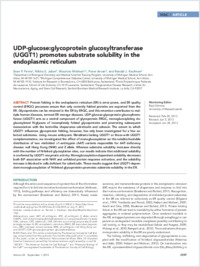UDP-glucose : glycoprotein glucosyltransferase (UGGT1) promotes substrate solubility in the endoplasmic reticulum
- Ferris, Sean P. Department of Biological Chemistry and Medical Scientist Training Program, University of Michigan Medical School, Ann Arbor, MI 48109-1621
- Jaber, Nikita S. Michigan Comprehensive Diabetes Center, University of Michigan Medical School, Ann Arbor, MI 48105-1910
- Molinari, Maurizio Institute for Research in Biomedicine (IRB), Faculty of Biomedical Sciences, Università della Svizzera italiana, Switzerland - Ecole Polytechnique Fédérale de Lausanne, School of Life Sciences, CH-1015 Lausanne, Switzerland
- Arvan, Peter Michigan Comprehensive Diabetes Center, University of Michigan Medical School, Ann Arbor, MI 48105-1910
- Kaufman, Randal J. Degenerative Disease Research, Center for Neuroscience, Aging, and Stem Cell Research, Sanford-Burnham Medical Research Institute, La Jolla, CA 92037
-
28.06.2013
Published in:
- Molecular biology of the cell. - 2013, vol. 24, no. 17, p. 2597-2608
English
Protein folding in the endoplasmic reticulum (ER) is error prone, and ER quality control (ERQC) processes ensure that only correctly folded proteins are exported from the ER. Glycoproteins can be retained in the ER by ERQC, and this retention contributes to multiple human diseases, termed ER storage diseases. UDP- glucose:glycoprotein glucosyltransferase (UGGT1) acts as a central component of glycoprotein ERQC, monoglucosylating deglucosylated N-glycans of incompletely folded glycoproteins and promoting subsequent reassociation with the lectin-like chaperones calreticulin and calnexin. The extent to which UGGT1 influences glycoprotein folding, however, has only been investigated for a few selected substrates. Using mouse embryonic fibroblasts lacking UGGT1 or those with UGGT1 complementation, we investigated the effect of monoglucosylation on the soluble/insoluble distribution of two misfolded α1-antitrypsin (AAT) variants responsible for AAT deficiency disease: null Hong Kong (NHK) and Z allele. Whereas substrate solubility increases directly with the number of N-linked glycosylation sites, our results indicate that additional solubility is conferred by UGGT1 enzymatic activity. Monoglucosylation-dependent solubility decreases both BiP association with NHK and unfolded protein response activation, and the solubility increase is blocked in cells deficient for calreticulin. These results suggest that UGGT1-dependent monoglucosylation of N-linked glycoproteins promotes substrate solubility in the ER.
- Language
-
- English
- Classification
- Biological sciences
- License
- Open access status
- hybrid
- Identifiers
-
- RERO DOC 324214
- ARK ark:/12658/srd1318936
- Persistent URL
- https://n2t.net/ark:/12658/srd1318936
Statistics
Document views: 174
File downloads:
- Texte intégral: 186
